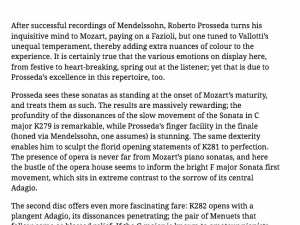1 May 2017 International Piano
Mozart: Piano Sonatas 1 - 6 (Decca)
After successful recordings of Mendelssohn, Roberto Prosseda turns his inquisitive mind to Mozart, paying on a Fazioli, but one tuned to Vallotti’s unequal temperament, thereby adding extra nuances of colour to the experience. It is certainly true that the various emotions on display here, from festive to heart-breaking, spring out at the listener; yet that is due to Prosseda’s excellence in this repertoire, too.
Prosseda sees these sonatas as standing at the onset of Mozart’s maturity, and treats them as such. The results are massively rewarding; the profundity of the dissonances of the slow movement of the Sonata in C major K279 is remarkable, while Prosseda’s finger facility in the finale (honed via Mendelssohn, one assumes) is stunning. The same dexterity enables him to sculpt the florid opening statements of K281 to perfection. The presence of opera is never far from Mozart’s piano sonatas, and here the bustle of the opera house seems to inform the bright F major Sonata first movement, which sits in extreme contrast to the sorrow of its central Adagio.
The second disc offers even more fascinating fare: K282 opens with a plangent Adagio, its dissonances penetrating; the pair of Menuets that follow come as blessed relief. If the G major is known to amateur pianists everywhere, Prosseda reminds us of its eloquence (it sounds particularly bright here). Finally, the so-called Dürnitz Sonata, with its quarter- hour set of variations as finale, in a most alive performance (Prosseda includes the ornamentation given in the 1874 Torricella edition); and a performance of a fragment of a draft for the first movement, a fascinating glimpse of work in progress.


